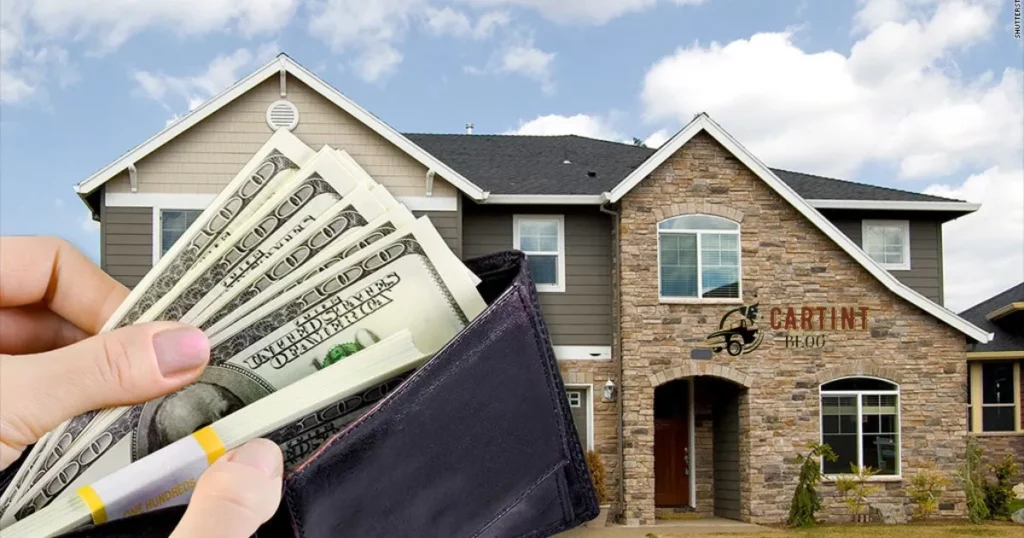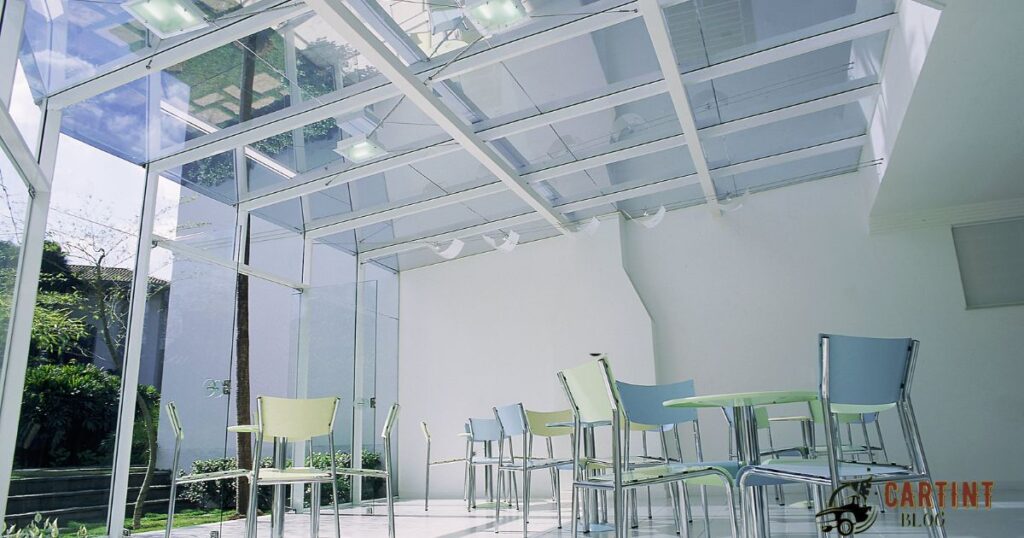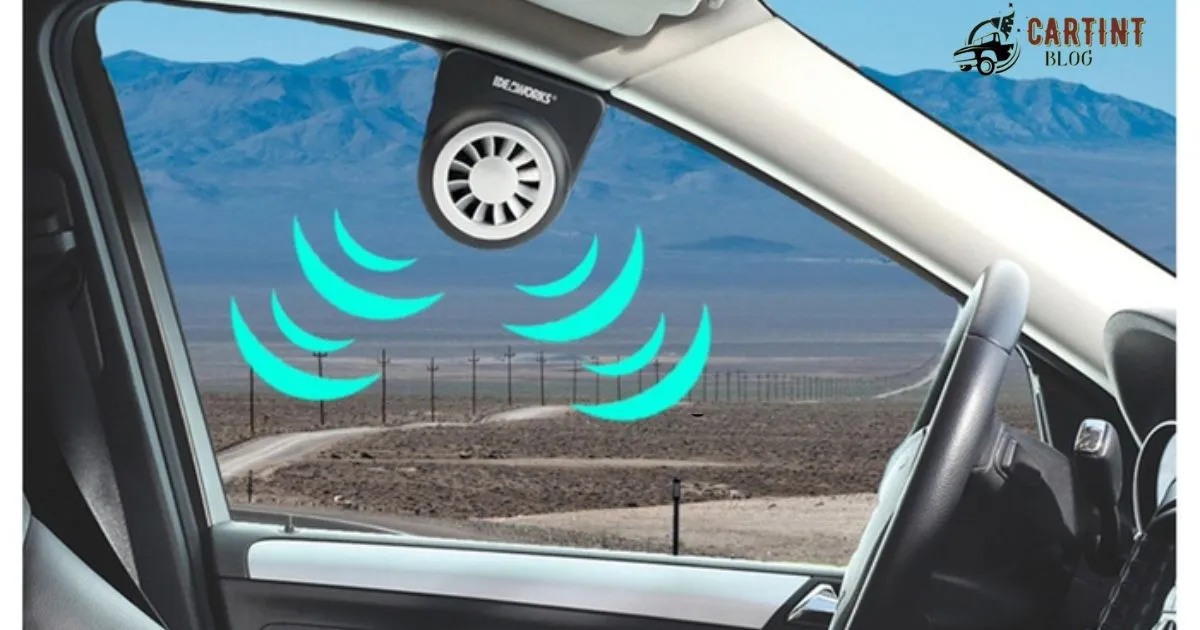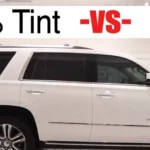Tinted windows are designed to reduce the amount of sunlight and heat that enters a car. By applying a thin, shaded film to the windows, they block a significant portion of the sun’s rays, helping to keep the interior cooler. This process is particularly beneficial in warmer climates or during hot summer days.
Curious about whether tinted windows can make a real difference in the comfort of your car? The answer to the question Do tinted windows keep car cooler? lies in the science behind their design. As we explore the impact of tinted windows on temperature control, you’ll discover practical insights that could enhance your driving experience and create a more pleasant environment inside your vehicle.
Beyond aesthetics, tinted windows offer a practical solution to combating the heat. They not only provide a cooler interior by reducing glare and blocking harmful UV rays but also contribute to preserving the condition of your car’s upholstery. With improved heat management, tinted windows can make a notable difference in creating a more enjoyable and comfortable driving environment.
Purpose of Window Tinting
- Window tinting serves multiple purposes, with one key aspect being its ability to keep cars cooler in hot weather.
- Tinted windows block a significant amount of sunlight and heat, reducing the interior temperature of a car and providing a more comfortable driving experience.
- The tint film acts as a barrier, preventing the sun’s rays from entering the vehicle and minimizing the greenhouse effect.
- By limiting heat absorption, tinted windows also contribute to energy efficiency by reducing the need for excessive air conditioning, resulting in lower fuel consumption.
- Overall, the primary purpose of window tinting, especially in relation to keeping cars cooler, lies in its effective control of solar heat and UV rays.
How Tinted Windows Impact Temperature
Tinted windows play a crucial role in regulating the temperature inside a car. They effectively reduce the amount of sunlight and heat that enters the vehicle, thereby keeping the interior cooler.
This is achieved by the tint film, which acts as a barrier, preventing a significant portion of the sun’s rays from penetrating the windows. The impact of tinted windows on temperature is noticeable, especially during hot weather.
By limiting heat absorption, tinted windows help maintain a more comfortable and cooler environment inside the car. This proves beneficial for both driver and passengers, enhancing overall driving experience and promoting a more pleasant journey.
How Does Window Tinting Work?
Window tinting works by applying a thin, transparent film to the windows of a car. This film is typically made of polyester and is coated with a layer of special dyes or metals. The process involves carefully adhering the film to the interior side of the windows, and it serves several purposes, one of which is heat reduction.
Tinted windows help keep a car cooler by blocking a significant amount of the sun’s infrared rays and UV radiation. These rays are responsible for heating up the interior of the vehicle. The tinted film acts as a barrier, preventing a substantial portion of the sun’s energy from entering the car.
When people tint their windows, they not only ensure a cooler interior, enhancing the driving comfort, but also effectively reduce heat. This process offers added advantages like glare reduction and shielding against harmful UV rays, making it a comprehensive choice for improved driving experiences.
Window Tint Temperature Difference
Tinted windows can indeed make a noticeable difference in the temperature inside your car. By reducing the amount of sunlight that enters, window tinting helps to block out a significant portion of the sun’s heat.
This results in a cooler interior, making it more comfortable for occupants during hot weather.Tinted windows also play a crucial role in protecting the car’s interior from UV rays, which can cause damage and fading to the upholstery and dashboard.
The temperature reduction provided by tinted windows enhances driving comfort, particularly in warm climates, and contributes to preserving the longevity and appearance of your vehicle’s interior.
What Causes Tinted Car Windows to Fog Up?
Tinted car windows may fog up due to temperature variations and humidity inside the vehicle. When warm air inside the car comes into contact with the cooler surface of tinted windows, condensation occurs, leading to fogging.
The level of tint on windows does not significantly impact fogging rather, it’s the difference in temperature and humidity that plays a key role.
Regarding the question of whether tinted windows keep a car cooler, it’s essential to note that window tint primarily helps in reducing heat from sunlight. The tint film blocks a portion of the sun’s rays, minimizing the greenhouse effect inside the car.
The extent of cooling depends on factors such as the tint level, climate, and the overall design of the vehicle’s ventilation system. Tinted windows alone may not provide sufficient cooling in extremely hot conditions, and the effectiveness varies based on these factors.
Here’s a detailed table summarizing the information about tinted car windows and their impact on fogging and cooling
| Aspect | Explanation |
| Causes of Tinted Windows Fogging | Tinted windows can fog up when warm air inside the car meets the cooler surface of the tinted glass. This condensation is a result of temperature variations and humidity levels within the vehicle. |
| Factors Influencing Fogging | The degree of tint on the windows does not significantly affect fogging. Instead, it is the difference in temperature and humidity that plays a crucial role in the occurrence of condensation on tinted surfaces. |
| Effectiveness of Tint in Cooling | Tinted windows contribute to reducing heat from sunlight, thereby minimizing the greenhouse effect inside the car. However, the cooling effect varies based on factors like tint level, climate, and the vehicle’s ventilation system. |
| Dependency on Additional Factors | While tinted windows offer some cooling benefits, their effectiveness alone may not be sufficient in extremely hot conditions. The overall impact depends on variables such as the tint level, climate conditions, and the design of the car’s ventilation system. |
Heat Blocking Mechanism of Tinted Windows

Tinted windows employ a specialized coating that reduces the amount of heat entering your car. This coating acts as a barrier, preventing a significant portion of sunlight and its accompanying heat from penetrating the vehicle.
The tinted film absorbs and reflects sunlight, helping to keep the interior cooler and more comfortable. Tinted windows effectively block a substantial percentage of the sun’s infrared radiation, which is a major contributor to heat build-up inside a car.
By minimizing the impact of sunlight, tinted windows contribute to maintaining a cooler temperature in your vehicle, offering both comfort and potential energy savings by reducing the need for excessive air conditioning.
How Do Tinted Windows Block Out Heat?
Tinted windows block out heat by reducing the amount of sunlight that enters the car. The tinting film applied to the windows acts as a barrier, preventing a significant portion of the sun’s infrared radiation from penetrating.
This helps in keeping the car cooler, as less heat is allowed to build up inside. The tinted film works by absorbing and reflecting the sun’s rays, particularly the ones responsible for generating heat.
It serves as an effective heat insulator, contributing to a more comfortable interior temperature. Tinted windows do indeed keep a car cooler by minimizing the impact of sunlight and reducing the overall heat absorption within the vehicle.
How Much Heat Can Be Blocked by Tinted Windows?
Tinted windows can significantly reduce the amount of heat entering a car. The degree of heat blockage depends on the tint level, with darker tints generally offering better heat reduction.
For instance, high-quality ceramic tints can block up to 99% of harmful UV rays, providing a more comfortable and cooler interior environment for occupants. In hot weather, tinted windows act as a barrier, preventing the sun’s direct rays from penetrating and heating up the car’s interior.
This helps maintain a cooler temperature inside the vehicle, reducing the need for excessive air conditioning use. In conclusion, tinted windows play a crucial role in blocking heat, ensuring a more pleasant driving experience in warm conditions.
Additional Benefits of Tinted Windows
Tinted windows offer more than just enhanced privacy for your vehicle. One notable benefit is their ability to keep your car cooler in the scorching heat.
By reducing the amount of direct sunlight entering the vehicle, tinted windows significantly minimize interior heat buildup, creating a more comfortable driving experience.Tinted windows contribute to the preservation of your car’s interior.
The sun’s harmful UV rays can lead to fading and deterioration of your vehicle’s upholstery and dashboard. Tinted windows act as a protective barrier, shielding your car’s interior from these damaging effects and helping maintain its aesthetic appeal and resale value.
Protection from UV Rays
Tinted windows act as a barrier against harmful UV rays, safeguarding both the car’s occupants and its interior. The tint film blocks the majority of ultraviolet rays, preventing damage to the skin and minimizing fading of the car’s upholstery and dashboard.
Improved Privacy
Tinted windows provide an enhanced level of privacy by limiting the visibility into the car. Passersby are unable to easily see the interior, offering occupants a sense of seclusion and security.
This added privacy is particularly beneficial when parked in public spaces or during moments when you desire a more discreet environment.
Reduced Glare
Tinted windows significantly reduce glare from the sun, creating a more comfortable driving experience.
Glare from sunlight can be distracting and even hazardous, especially during certain times of the day. Tinted windows help minimize this glare, promoting safer and more focused driving.
Improved Comfort
By blocking a portion of the sun’s heat, tinted windows contribute to a cooler interior, enhancing overall comfort.
This is particularly advantageous in hot climates, as it helps maintain a more pleasant temperature inside the car. The reduced heat also contributes to less reliance on air conditioning, potentially improving fuel efficiency.
Here’s a detailed table summarizing the information
| Feature | Description |
| Protection from UV Rays | Tinted windows act as a barrier against harmful UV rays, preventing skin damage and reducing fading of the car’s interior. |
| Improved Privacy | Tinted windows enhance privacy by limiting visibility into the car, providing occupants with a sense of seclusion and security. |
| Reduced Glare | Tinted windows significantly minimize glare from the sun, creating a safer and more comfortable driving experience, especially during certain times of the day. |
| Improved Comfort | Tinted windows contribute to a cooler interior, enhancing overall comfort by blocking a portion of the sun’s heat. This is particularly beneficial in hot climates. |
Each feature is described briefly, highlighting the key benefits of tinted windows in a clear and concise manner.
How Much Will Tinted Windows Cost?

Tinted windows can vary in cost depending on the type of vehicle you own. For smaller cars, the average price ranges from $100 to $400, while larger vehicles like trucks or SUVs may cost between $200 and $800.
Prices can be influenced by factors such as the quality of the tint and the specific shop you choose.When it comes to keeping your car cooler, tinted windows are effective at reducing heat.
They block a significant amount of sunlight, preventing the interior from heating up quickly. High-quality window tint can lower the temperature inside your car by up to 15 degrees Fahrenheit, making it a practical investment for enhanced comfort, especially during hot weather.
Here’s a detailed table summarizing the cost of tinted windows for different vehicles and the impact of tinted windows on car cooling
| Vehicle Type | Average Cost Range for Tinted Windows | Impact on Car Cooling |
| Small Cars | $100 – $400 | Effective in reducing interior heat |
| Midsize Cars | $150 – $500 | Blocks sunlight, preventing rapid interior heating |
| Large Cars | $200 – $600 | Helps maintain a cooler temperature inside the car |
| SUVs | $200 – $800 | Significant reduction in interior heat |
| Trucks | $200 – $800 | Enhances overall comfort, especially in hot weather |
The cost ranges provided are approximate and may vary based on factors such as tint quality, installation location, and specific vehicle models. Tinted windows are generally effective in reducing interior heat by blocking sunlight, with higher-quality tint offering greater temperature reduction, up to 15 degrees Fahrenheit in some cases.
Effectiveness of Window Tint in Cooling Cars
Window tint significantly enhances the cooling efficiency of cars. Tinted windows block a substantial amount of solar radiation, preventing heat buildup inside the vehicle.
This results in a cooler interior, reducing the need for excessive air conditioning and improving overall comfort for passengers. Tinted windows act as a barrier, reflecting and absorbing sunlight to maintain a pleasant temperature within the car.
The direct impact is a more comfortable driving experience, especially in hot weather conditions. In conclusion, the effectiveness of window tint in keeping cars cooler is well-established, making it a practical and efficient solution for temperature control inside vehicles.
Does Window Tinting Keep Your Car Cooler?
Certainly! Window tinting is effective in keeping your car cooler by reducing the amount of heat that enters through the windows. Tinted windows block a significant portion of the sun’s infrared rays, preventing them from penetrating into the car’s interior.
This helps maintain a cooler temperature inside, especially during hot weather.The tinting film acts as a barrier, minimizing the greenhouse effect within the vehicle. By reducing heat absorption, tinted windows not only enhance comfort but also contribute to better energy efficiency, as the air conditioning system doesn’t need to work as hard to cool the interior.
Overall, investing in window tinting for your car can provide a more pleasant driving experience while offering practical benefits in temperature regulation.
How Much Cooler Is a Car with Tinted Windows?
Tinted windows can significantly reduce the heat inside a car. On a hot day, tinted windows block a substantial amount of sunlight, preventing the car’s interior from becoming excessively hot.
According to studies, cars with tinted windows can experience temperature reductions of up to 15 degrees Fahrenheit compared to those without.The cooling effect of tinted windows is attributed to their ability to block UV rays and solar heat.
In fact, high-quality window tinting can reject up to 99% of harmful UV rays, safeguarding both the car’s interior and its occupants from sun damage. Ultimately, opting for tinted windows not only enhances privacy and aesthetics but also provides a tangible and measurable cooling benefit for a more comfortable driving experience.
Can Window Tint Keep Cars Cool?
Yes, window tint can indeed keep cars cooler. Tinted windows reduce the amount of sunlight entering the car, blocking harmful UV rays and minimizing heat absorption.
In fact, studies show that quality window tints can decrease interior temperatures by up to 15 degrees Fahrenheit, creating a more comfortable driving experience. Tinted windows help preserve the car’s interior by preventing sun damage to the dashboard, seats, and other surfaces.
This not only enhances comfort but also protects the vehicle’s overall condition. To maximize the cooling benefits, it’s advisable to choose a reputable window tint with a high solar heat rejection percentage, typically ranging from 35% to 70%.
Car Window Tinting Drawbacks
- Limited Cooling Effect Tinted windows, while providing some reduction in heat, have limitations. They do not guarantee a significant cooling effect in all conditions.
- Dependency on Tint Grade The extent of cooling depends on the grade of tint used. Lighter tints may offer minimal cooling, while darker tints provide better heat rejection.
- Impact on Night Visibility Tinted windows can reduce visibility at night, potentially compromising safety. The level of tint darkness should comply with local regulations to ensure adequate visibility.
Effectiveness of Tinted Windows in Cooling

- Moderate Temperature Reduction Tinted windows can moderately reduce interior temperatures, especially in sunny conditions. On average, they may lower the temperature by 5 to 15 degrees Fahrenheit.
- Influence of Window Orientation The effectiveness varies based on the direction the car is facing. Tinted windows are more beneficial in reducing heat when the car is parked facing the sun.
- Consideration of Local Climate The impact of tinted windows on cooling is more pronounced in hot climates. In cooler climates, the cooling effect may be less noticeable.
The information provided is based on general observations, and the effectiveness of window tinting may vary based on individual circumstances and specific tinting products used.
Car Window Tinting Benefits
- Tinted windows significantly reduce heat inside your car by blocking harmful UV rays, which can lead to a cooler interior temperature.
- According to studies, window tinting can reduce the interior temperature of a car by up to 15 degrees Fahrenheit, providing a more comfortable driving experience.
- Tinted windows also protect your car’s interior from sun damage, preventing fading and cracking of upholstery and dashboard components.
- By blocking glare, tinted windows improve visibility, reducing eye strain and enhancing overall driving safety.
Additional Benefits of Car Window Tinting
- Tinted windows provide privacy for occupants and valuables inside the car, discouraging potential theft.
- The UV-blocking properties of window tinting help prevent skin damage and reduce the risk of skin cancer for frequent drivers.
- Professionally applied window tinting enhances the aesthetic appeal of your vehicle while adding a layer of security and comfort.
FAQs
Does tinting windows reduce heat?
Tinted windows significantly reduce heat by blocking harmful UV rays, creating a cooler interior environment.
What is the best tint to keep the car cool?
Ceramic window tint is considered the most effective in keeping a car cool as it provides superior heat rejection.
Does tinting windows reduce cold?
Window tinting primarily focuses on reducing heat, and its impact on cold temperatures is minimal.
How much heat does tinting reduce?
Studies show that window tinting can reduce the interior temperature of a car by up to 15 degrees Fahrenheit.
Does tint percentage affect heat?
The percentage of tint can impact heat reduction, with darker tints generally providing more effective heat blocking.
What is the best window tint to block heat?
Ceramic window tint is recommended for its excellent heat-blocking properties and overall performance.
Is window tinting really worth it?
Yes, window tinting is worth it, offering benefits such as heat reduction, UV protection, enhanced privacy, and improved aesthetics.
Conclusion
In conclusion, opting for car window tinting brings about numerous advantages that contribute to a more enjoyable and comfortable driving experience. With the ability to significantly reduce interior temperatures, especially during scorching days, tinted windows create a cooler atmosphere inside the vehicle.
This not only enhances comfort for the occupants but also helps in preserving the car’s interior by preventing damage from harmful UV rays. Beyond temperature control, the aesthetic appeal, increased privacy, and added safety make window tinting a worthwhile investment for any vehicle owner.
The combination of these benefits showcases the practicality and value that tinted windows bring to both the driver and the car itself, making it a decision that extends far beyond mere style.



